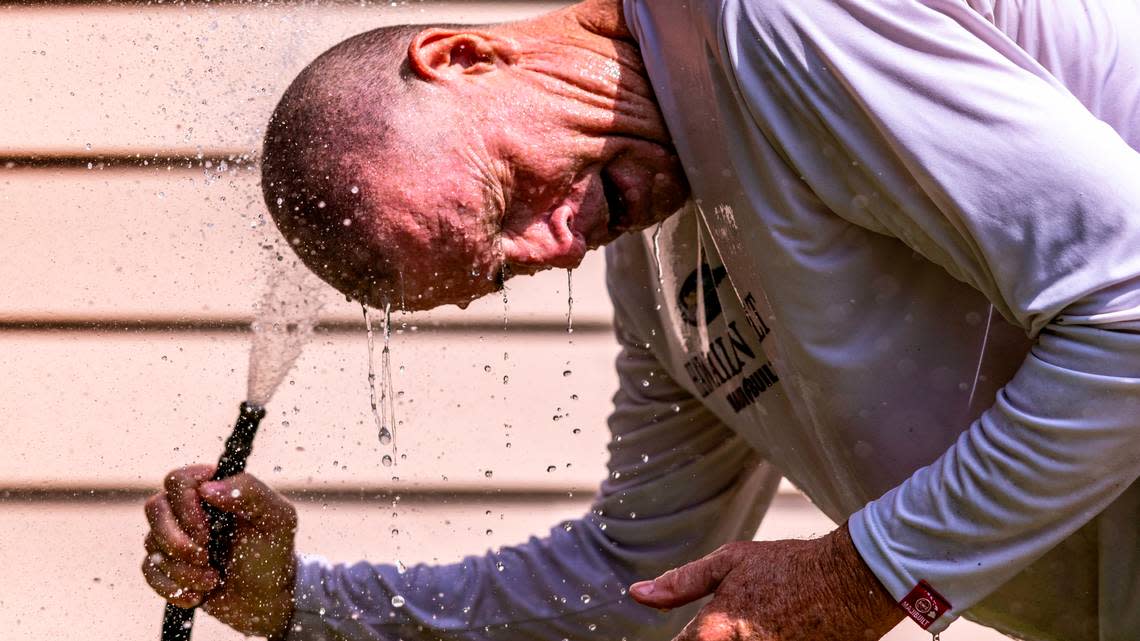Higher overnight lows add to NC’s heat risk. And ‘very warm’ nights are ahead.

Daytime temperatures that soar above 95 degrees Fahrenheit and heat indexes that breach 100 aren’t going to be the only threat from the heat over the coming week.
Overnight temperatures aren’t going to offer much of a break, with the National Weather Service forecasting every night between now and Thursday to remain above 70 degrees, the threshold for what scientists call a warm night. This weekend’s nighttime temperatures will both remain above 75 degrees, the point at which climate scientists deem it a very warm night.
“When those overnight temperatures don’t drop very much, it doesn’t give anything a chance to cool off,” said Mark Lockhart, the director of Durham County’s Office of Emergency Services.
That impact can be felt more in urban areas, where asphalt and concrete soak up heat during the daytime and stay warm well after the sun sets, Lockhart added. Temperatures in urban areas are typically about 2 to 5 degrees higher than rural areas because of this effect, according to the U.S. Environmental Protection Agency.
Kathie Dello, the N.C. state climatologist and director of the N.C. State Climate Office, said the higher overnight temperatures increase risks for people who don’t have access to air conditioning, particularly children, elderly people and pregnant people.
“Heat’s just a stressor on a lot of underlying conditions. And that’s sometimes why it’s hard to quantify heat-related illness and death, because one might go to the emergency room for cardiac arrest or dehydration and it may have been exacerbated by heat or it may not have happened without the impact of heat,” Dello said.
Climate change and overnight lows
This weekend’s lows are about 8 to 9 degrees higher than the average minimum temperature at Raleigh-Durham International Airport between 1991 and 2020, according to data from the N.C. State Climate Office.
The N.C. Climate Science Report, released in 2020, found that overnight temperatures are.a key sign of climate change in the state. While the number of days above 90 or 95 degrees had not increased since 1900, scientists found, the number of nights where temperatures remained above 70 or 75 degrees had.
Scientists also found that the number of very warm nights is likely to increase by 2040, particularly in the Piedmont and Coastal Plain regions.
From the 1940s to the 1960s, Dello said, nights where temperatures remained above 75 degrees were extremely rare, happening about once a decade. Under the current forecast, Raleigh would reach that threshold twice this weekend.
“We’re seeing nighttime temperatures get warmer and warmer in a really noticeable way,” Dello said.
Globally, scientists point to clouds as a key factor in the increase in overnight temperatures. As the planet warms, the atmosphere is able to contain more moisture and more clouds form.
At night, those clouds result in temperatures falling less than they would have under clear skies. That’s because clouds are sending heat that they’ve absorbed from sunlight during the day down to the surface, even as heat coming from the surface is keeping the bottom of those clouds warm.
Places with more cloud cover experienced faster nighttime warming than daytime warming, researchers from the United Kingdom found in a 2020 study.
How to stay cool overnight
People can protect themselves in the evenings by being intentional about decreasing their body temperature and working to keep it down, Dello said.
Measures such as soaking feet or arms in cool water, taking a cool shower and sleeping in the coolest possible place are all useful. Another thing to consider is eating dinner earlier, to avoid raising the body temperature during digestion.
Wiping your arms, neck and head down with a cloth dipped in cool water and then sitting in front of a fan could also be helpful, Ashley Ward, the director of Duke Universit’ys Heat Policy Innovation Hub, told The News & Observer. That helps the body mimic the cooling effect of sweating.
“After a day outside or a hot day, getting home and trying to cool yourself down as fast as possible or taking that extra step to take that cold shower really does help a lot,” Dello said.
This story was produced with financial support from the Hartfield Foundation and Green South Foundation, in partnership with Journalism Funding Partners, as part of an independent journalism fellowship program. The N&O maintains full editorial control of the work. If you would like to help support local journalism, please consider signing up for a digital subscription, which you can do here.

